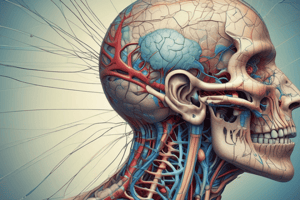Podcast
Questions and Answers
Which cranial nerve is responsible for regulating heart rate?
Which cranial nerve is responsible for regulating heart rate?
- Vagus Nerve (X) (correct)
- Glossopharyngeal Nerve (IX)
- Vestibulocochlear Nerve (VIII)
- Trigeminal Nerve (V)
Which test is used to assess the function of the Optic Nerve (II) and Oculomotor Nerve (III)?
Which test is used to assess the function of the Optic Nerve (II) and Oculomotor Nerve (III)?
- Visual Acuity Test
- Hearing Test
- Facial Nerve Test
- Pupillary Light Reflex (correct)
Which cranial nerve is responsible for the sense of smell?
Which cranial nerve is responsible for the sense of smell?
- Optic Nerve (II)
- Olfactory Nerve (I) (correct)
- Trigeminal Nerve (V)
- Oculomotor Nerve (III)
Which cranial nerve is responsible for the movement of the superior oblique muscle?
Which cranial nerve is responsible for the movement of the superior oblique muscle?
Which condition is associated with dysfunction of the Facial Nerve (VII)?
Which condition is associated with dysfunction of the Facial Nerve (VII)?
Which test is used to assess the function of the Hypoglossal Nerve (XII)?
Which test is used to assess the function of the Hypoglossal Nerve (XII)?
Which cranial nerve is responsible for transmitting sensory information related to hearing and balance?
Which cranial nerve is responsible for transmitting sensory information related to hearing and balance?
What is the term for weakness or paralysis of specific muscles or functions?
What is the term for weakness or paralysis of specific muscles or functions?
Which cranial nerve is responsible for the movement of the lateral rectus muscle?
Which cranial nerve is responsible for the movement of the lateral rectus muscle?
Which test is used to assess the function of the Glossopharyngeal Nerve (IX) and Vagus Nerve (X)?
Which test is used to assess the function of the Glossopharyngeal Nerve (IX) and Vagus Nerve (X)?
Flashcards are hidden until you start studying
Study Notes
Cranial Nerves
Overview
- 12 pairs of cranial nerves emerge from the brain, responsible for various sensory and motor functions
- Assessment of cranial nerves is crucial in neurological examinations
Cranial Nerve Functions
- Olfactory Nerve (I): sense of smell
- Optic Nerve (II): vision
- Oculomotor Nerve (III): eye movement, pupil constriction
- Trochlear Nerve (IV): superior oblique muscle movement
- Trigeminal Nerve (V): facial sensation, motor functions (chewing, biting)
- Abducens Nerve (VI): lateral rectus muscle movement
- Facial Nerve (VII): facial expressions, taste, hearing
- Vestibulocochlear Nerve (VIII): hearing, balance
- Glossopharyngeal Nerve (IX): swallowing, taste, salivation
- Vagus Nerve (X): swallowing, speaking, heart rate regulation
- Accessory Nerve (XI): neck and shoulder muscle movement
- Hypoglossal Nerve (XII): tongue movement
Cranial Nerve Assessment Techniques
- Visual Acuity Test: assesses Optic Nerve (II) function
- Pupillary Light Reflex: assesses Oculomotor Nerve (III) and Optic Nerve (II) function
- Facial Nerve Test: assesses Facial Nerve (VII) function (e.g., smile, raise eyebrows)
- Hearing Test: assesses Vestibulocochlear Nerve (VIII) function
- Gag Reflex Test: assesses Glossopharyngeal Nerve (IX) and Vagus Nerve (X) function
- Tongue Movement Test: assesses Hypoglossal Nerve (XII) function
Abnormal Findings and Associated Conditions
- Cranial Nerve Palsies: weakness or paralysis of specific muscles or functions
- Cranial Nerve Lesions: tumors, aneurysms, or injuries affecting cranial nerve function
- Neurological Disorders: associated with cranial nerve dysfunction (e.g., Bell's palsy, trigeminal neuralgia)
Studying That Suits You
Use AI to generate personalized quizzes and flashcards to suit your learning preferences.




